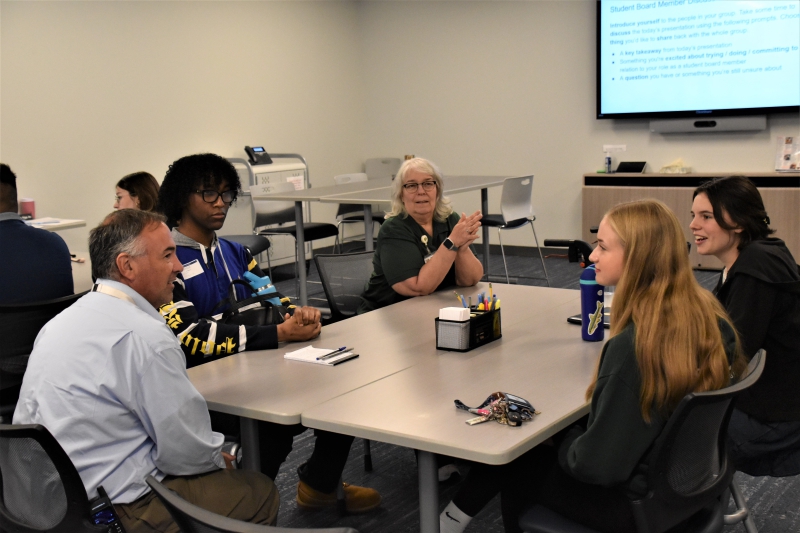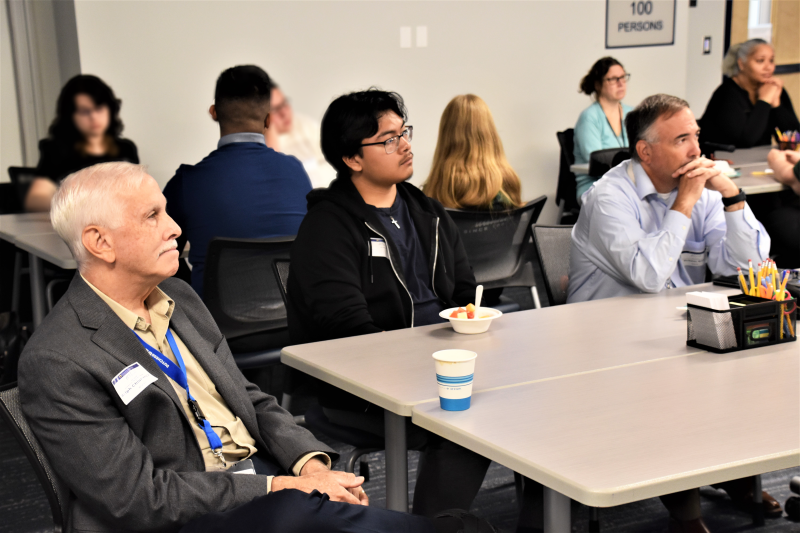 Students from Dutchess BOCES and its component districts gathered at the campus’ smaller conference room on Sept. 17 to learn how to be effective in their roles as ex officio student board members on the school boards of their respective districts.
Students from Dutchess BOCES and its component districts gathered at the campus’ smaller conference room on Sept. 17 to learn how to be effective in their roles as ex officio student board members on the school boards of their respective districts.
The training was held statewide over video with staff and students from the 36 other BOCES locations zooming in to hear from speakers, including New York State Sen. Shelley B. Mayer and State Assembly Member Carrie Woerner, who sponsored the bill requiring school boards to appoint at least one non-voting student member. Mayer said this bill, signed into law by Governor Kathy Hochul last year, was established because many school boards across the state were making crucial decisions for students without their input. While students will share their thoughts on many issues, they will not make decisions on personnel and confidential matters.
Before the law’s passing, Mayer and Woerner met with superintendents and students who were serving as representatives for their district’s school boards, highlighting its positive impact.
“The students thought it was an incredible experience that was important for them as they grew up … The superintendents felt like there was absolute value in the opinions and experience of someone who’s in the school every day,” Mayer recalled. “If there ever was a moment where we had to practice democracy and learn to listen to people whom we disagree with and sit in a room with people who have strong opinions that are not the same as ours, it is now.”
New York State Education Department Commissioner Betty Rosa advised students to be open to all ideas and back up their arguments with evidence, as well as honor the decisions a board makes, even if they do not personally agree with them.
“You’re not always going to advance an issue and come out of it the winner,” Rosa said. “It’s important that you realize when you’re part of a team, think about all sports, you win as a team, you lose as a team.”
Wynter Ross, a senior at John Jay High School, appreciated the training as it emphasized the importance of listening to students, particularly those who are not as vocal as others, to create change. She hopes to address topics surrounding school lunches and introduce mental health days to her board. She is working with Principal David Kedzielawa on creating an anonymous tip form to gather ideas and suggestions on certain policies.
“It’s so empowering to me to be able to honor my fellow students by being in this role,” Ross said. “I think that it’s about amplifying those voices and not speaking over them.”
BOCES Students Join BOE
 Johan Melchor Vasquez, a second-year student in the Career & Technical Institute’s culinary program, and Resilience Academy senior Mason McNair are the ex officio student board members for Dutchess BOCES’ Board of Education, and will attend their first in-person meeting on Oct. 8.
Johan Melchor Vasquez, a second-year student in the Career & Technical Institute’s culinary program, and Resilience Academy senior Mason McNair are the ex officio student board members for Dutchess BOCES’ Board of Education, and will attend their first in-person meeting on Oct. 8.
Since he does not have a predecessor, Melchor Vasquez said he will write the template of expectations and precedents that future student leaders should know. He already has leadership experience as a vice president of SkillsUSA at BOCES and was recommended by his instructor, Chef Amanda Scoca. Since Vasquez is a senior, he has been in the program for a year and brings context and an established path for student voice.
“It’s my first time doing something this big,” Melchor Vasquez said. “It seems like a lot of responsibility, but now that I’ve had the training, I’m not as nervous as I was before.”
What McNair found most helpful from the training was how students must plan out what they will discuss at board meetings and ask for it to be included on an agenda. McNair was not sure what to expect when he was first nominated, but once he learned more about the role, he was happy to serve.
“It’s nice that they do value the opinion of the student body enough to find people who would be a representative during those meetings,” McNair said. “It truly is an important thing to have that student voice.”
McNair is part of Resilience Academy’s Student Council and the S.A.D.D. committee.
One area McNair would like to research for future consideration is budgeting for programs at school. He offered this advice to students interested in leadership opportunities.
“Reach out to more people, even if it’s not for the purpose of being a representative of some sort,” McNair said. “It’s nice to meet people.”
